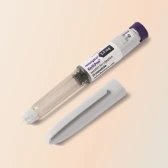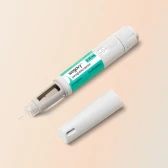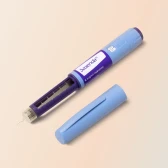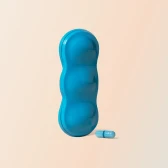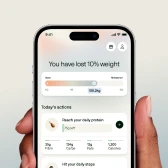While clinically low testosterone requires medical assessment (and often testosterone replacement therapy), the foods you eat every day can support healthy T levels.
Here’s what a testosterone-friendly diet looks like. And the foods that might be quietly working against you.
Why diet matters for testosterone
Testosterone is essential for energy, muscle mass, libido, mood and metabolic health in men. Nutrition and lifestyle can influence your baseline T levels and hormonal balance. Signs of low T include low sex drive, fewer morning erections, weight gain and persistent fatigue.
Diet can play a role in hormonal health because testosterone is made from cholesterol. This process depends on having sufficient amounts of the right building blocks—fats, micronutrients, and antioxidants—while avoiding inflammatory foods.
Foods and nutrients that support healthy testosterone levels
1. Healthy fats
Dietary fats supply cholesterol, the raw material for testosterone synthesis. Very low-fat diets have been shown in multiple trials to reduce total and free testosterone. So be sure to include healthy fats, such as extra-virgin olive oil, avocados, oily fish, nuts, seeds, and eggs, in your diet.
2. Zinc
Zinc is critical for testicular function and testosterone production. Some good sources include oysters, pumpkin seeds, red meat, poultry, and legumes.
3. Vitamin D
Low vitamin D levels are associated with lower testosterone in men. Sunlight exposure, fatty fish, fortified foods, and supplementation (if deficient) can help restore optimal levels. The NHS recommends taking vitamin D from October to early March because we don’t get enough from sunlight during the darker months.
4. Magnesium
Magnesium supports free testosterone by reducing sex hormone-binding globulin (SHBG) binding. Good sources of magnesium include leafy greens, nuts, seeds, and whole grains.
5. Antioxidants
Oxidative stress has been shown to hamper testosterone production. So, including lots of antioxidants in your diet might help boost your T levels. Good sources of antioxidants include cruciferous vegetables, berries, pomegranates, and leafy greens.
Foods and habits that lower your testosterone
1. Trans fats
Trans fats, found in fried foods, pastries, and processed snacks, are consistently linked to lower testosterone and poorer sperm quality. It’s best to minimise these foods in your diet if you can.
2. Alcohol
Occasional drinks are okay, but chronic heavy drinking damages testicular tissue and suppresses testosterone synthesis.
3. Ultraprocessed foods
Excess sugar, refined carbs, and processed foods drive insulin resistance and obesity—two of the strongest lifestyle-related causes of low testosterone.
4. Very low-fat diets
Some men turn to extreme fat restriction to lose weight, but this approach can backfire hormonally. Multiple reviews show that diets too low in fat reduce testosterone levels.
5. Liquorice and spearmint
Clinical studies, particularly in women with PCOS, show that large amounts of liquorice root or spearmint tea can lower testosterone levels.
Does soy lower testosterone levels?
Food high in soy (such as tofu or soy milk) contains isoflavones, plant compounds that can weakly bind to oestrogen receptors (phytoestrogens). Because of this, early animal studies raised concerns about “feminising” effects. But in humans, isoflavones act very differently—they’re far weaker than oestrogen and are often metabolised quickly.
High-quality studies show no meaningful reduction in testosterone in men consuming moderate amounts of soy foods.
Concerned about your T levels?
For healthy testosterone levels, your lifestyle does matter. A nutrient-dense, moderate-fat diet rich in zinc, vitamin D, antioxidants, and omega-3 fats - combined with adequate sleep, regular exercise, and minimal processed food and alcohol - forms the most reliable foundation for healthy testosterone levels.
But diet alone won’t correct clinically low testosterone. Check your levels today with an at-home blood test and see if TRT might be suitable for you.
Continue reading
- Male menopause (andropause)
- Benefits of testosterone replacement therapy
- Testosterone gel for men
- Nebido injection
- Enclomiphene citrate
- How and where to inject testosterone
- Subcutaneous testosterone injections
- TRT side effects
- Is TRT safe?
- Once you start testosterone therapy, can you stop?
- Is testosterone a steroid?
- High testosterone in men
- Oestradiol levels in men
- Does testosterone make you stronger?
- Does masturbation decrease testosterone?
- Does ashwagandha increase testosterone?
- Does nicotine increase testosterone?
- TRT cost in the UK
- How to get TRT in the UK
- Men’s health stigma around low testosterone

Chavarro, Jorge E et al. “Trans Fatty Acid Intake is Inversely Related to Total Sperm Count in Young Healthy Men.” Human Reproduction
Eacker, Stephen M et al. “Hormonal Regulation of Testicular Steroid and Cholesterol Homeostasis.” Molecular Endocrinology (Baltimore, Md.
Emanuele, M A, and N V Emanuele. “Alcohol's Effects on Male Reproduction.” Alcohol health and research world vol. 22,3 (1998): 195-201.
Excoffon, L et al. “Magnesium Effect on Testosterone-SHBG Association Studied by a Novel Molecular Chromatography Approach.” Journal of Pharmaceutical and Biomedical Analysis 
Fallah, Ali et al. “Zinc is an Essential Element for Male Fertility: A Review of Zn Roles in Men's Health, Germination, Sperm Quality, and Fertilisation.” Journal of Reproduction and Infertility
Grant, Paul. “Spearmint Herbal Tea has Significant Anti-androgen Effects in Polycystic Ovarian Syndrome. A Randomized Controlled Trial.” Phytotherapy Research: PTR vol. 24, no. 2
Monson, Neetha R et al. “Association Between Vitamin D Deficiency and Testosterone Levels in Adult Males: A Systematic Review.” Cureus
Muraleedharan, Vakkat, and T Hugh Jones. “Testosterone and the Metabolic Syndrome.” Therapeutic Advances in Endocrinology and Metabolism
Reed, Katharine E., et al. "Neither Soy nor Isoflavone Intake Affects Male Reproductive Hormones: An Expanded and Updated Meta-analysis of Clinical Studies." Reproductive Toxicology
Whittaker, Joseph, and Kexin Wu. “Low-fat Diets and Testosterone in Men: Systematic Review and Meta-analysis of Intervention Studies.” The Journal of Steroid Biochemistry and Molecular Biology
“Vitamin D.” NHS. https://www.nhs.uk/conditions/vitamins-and-minerals/vitamin-d. 


